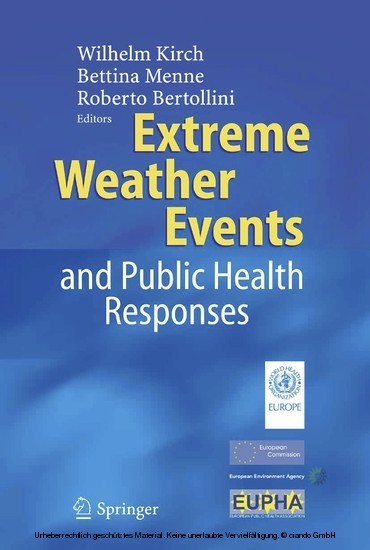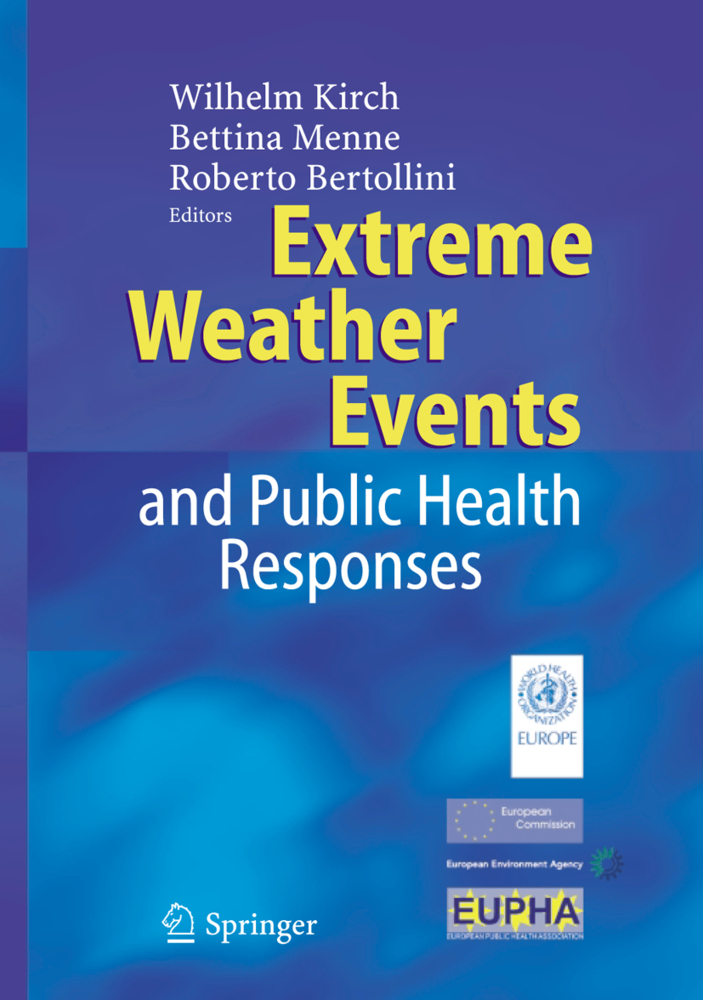Extreme Weather Events and Public Health Responses
In February 2004, the WHO Regional Office for Europe and the European Environment Agency organized an expert meeting to exchange information and develop recommendations on public health and environmental responses to weather and climate extremes, floods, heat-waves and cold spells. The meeting was kindly hosted by the Ministry of Health of Slovakia. The meeting recommendations were adopted at the Fourth Ministerial Conference on Environment and Health, Budapest, Hungary, 2004.
This book reflects a collection of case studies and experiences of experts, ministries and international organizations. It gives an overview of various topics, such as:
- Will climate change alter climate variability?
- The 2003 European heat-wave
- The health impacts of temperature extremes
- Public health responses to temperature extremes
- The health impacts of floods
- Case studies on health system responses to extreme events The global climate is changing. During the last 100 years warming has been observed in all continents with an average increase of 0.6 ± 0.2°C (man ± SD) in the course of the 20th century. The greatest temperature changes occurred at middle and high latitudes in the northern hemispheres. The trend towards warmer average surface temperatures for the period since 1976 is roughly three times that of the past 100 years as a whole. In the last decades warming seems to be attributable to human activities (man-made environmental changes) like land-use changes, deforestation, urbanisation and the reduction of wetlands. Global climate change is likely to be accompanied by an increase in frequency and intensity of extreme weather events. Climate variability occurs at both the level of gradual change as well as the level of extreme events.
Extreme weather events are those events which society is unable to cope with. They are by definition rare stochastic events. Europe has experienced on unprecedented rate of extreme weather events in the last 30 years. Heat waves occurred in France, Italy, Portugal, Russian Federation, Hungary and Bulgaria between 2000 and 2003. The annual number of warm extremes increased twice as fast as expected based on the corresponding decrease in the rate of cold extremes. On the other hand cold waves brought serious health problems to Northern Europe, Russian Federation and even Bosnia Herzegovina. In 2002 Romania suffered deleterious windstorms and Public Health responses were necessary. Last but not least, in recent years severe flooding occurred in many European countries like U.K., Poland, Czech Republic, Austria, Italy and Germany causing enormous damages, e.g. in August 2002. On the basis of current predictions on climate, more extreme weather events have to be faced in the coming years and they are likely to be more severe. Thus appropriate actions have to be undertaken in order to protect the population and the countries affected.
In this book, articles under the following headings are published: "Climate variability and extremes in Europe", "Temperature extremes and health impact", "Response to temperature extremes", "Flooding: the impact on human health", "National case-studying of health care system responses to extreme weather events" and "Recommendations for Public Health responses to extreme weather events". They shed light on the mode of development and the damages caused by extreme weather events and finally give some hints of what has to be done to cope with them.
This book reflects a collection of case studies and experiences of experts, ministries and international organizations. It gives an overview of various topics, such as:
- Will climate change alter climate variability?
- The 2003 European heat-wave
- The health impacts of temperature extremes
- Public health responses to temperature extremes
- The health impacts of floods
- Case studies on health system responses to extreme events The global climate is changing. During the last 100 years warming has been observed in all continents with an average increase of 0.6 ± 0.2°C (man ± SD) in the course of the 20th century. The greatest temperature changes occurred at middle and high latitudes in the northern hemispheres. The trend towards warmer average surface temperatures for the period since 1976 is roughly three times that of the past 100 years as a whole. In the last decades warming seems to be attributable to human activities (man-made environmental changes) like land-use changes, deforestation, urbanisation and the reduction of wetlands. Global climate change is likely to be accompanied by an increase in frequency and intensity of extreme weather events. Climate variability occurs at both the level of gradual change as well as the level of extreme events.
Extreme weather events are those events which society is unable to cope with. They are by definition rare stochastic events. Europe has experienced on unprecedented rate of extreme weather events in the last 30 years. Heat waves occurred in France, Italy, Portugal, Russian Federation, Hungary and Bulgaria between 2000 and 2003. The annual number of warm extremes increased twice as fast as expected based on the corresponding decrease in the rate of cold extremes. On the other hand cold waves brought serious health problems to Northern Europe, Russian Federation and even Bosnia Herzegovina. In 2002 Romania suffered deleterious windstorms and Public Health responses were necessary. Last but not least, in recent years severe flooding occurred in many European countries like U.K., Poland, Czech Republic, Austria, Italy and Germany causing enormous damages, e.g. in August 2002. On the basis of current predictions on climate, more extreme weather events have to be faced in the coming years and they are likely to be more severe. Thus appropriate actions have to be undertaken in order to protect the population and the countries affected.
In this book, articles under the following headings are published: "Climate variability and extremes in Europe", "Temperature extremes and health impact", "Response to temperature extremes", "Flooding: the impact on human health", "National case-studying of health care system responses to extreme weather events" and "Recommendations for Public Health responses to extreme weather events". They shed light on the mode of development and the damages caused by extreme weather events and finally give some hints of what has to be done to cope with them.
1. The Climate Dilemma- A. Navarra - 2. Projected Changes in Extreme Weather and Climate Events in Europe?- G.R. McGregor, D. Stephenson, C. Ferro - 3. Is the Frequency and Intensity of Flooding Changing in Europe- Z.W. Kundzewicz - 4. Bio-climatological Aspects of Summer 2003 Over France- J.-C. Cohen, J.-M. Veysseire, P. Bessemoulin - 5. Improving Public Health Responses to Extreme Weather Events- K. L. Ebi - 6. Cold Extremes and Impacts on Health- J. Hassi - 7. Temperature Regulation, Heat Balance and Climatic Stress- G. Havenith - 8. Health Impact of the 2003 Heat Wave in France- S. Vandentorren, P. Empereur-Bissonnet - 9. Portugal, Summer 2003 Mortality: the Heat Waves Influence- R. Calado, J. Botelho, Judite Catarino, M. Carreira - 10. The Effects of Temperature and Heat Waves on Daily Mortality in Budapest, Hungary, 1970 2000- A. Paldy, J. Bobvos, A. Vßmos, S. Kovats, S. Hajat - 11. Epidemiologic Study of Mortality During Summer 2003 in Italian Regional Capitals: Results of a Rapid Survey- S. Conti, G. Minelli, R. Solimini, V. Toccaceli, M. Vichi, C. Beltrano, L. Perini - 12. Heat Waves in Italy: Cause Specific Mortality and the Role of Educational Level and Socio-Economic Conditions- P. Michelozzi, F. de Donato, L. Bisanti, A. Russo, E. Cadum, M. DeMaria, M. D Ovidio, G. Costa, C.A. Perucci - Response to Temperature Extremes - 13. Lessons of the 2003 Heat Wave in France and Action Taken to Limit the Effects of Future Heat Waves- T. Michelon, P. Magne, F. Simon-Delavelle - 14. Examples of Heat Health Warning Systems: Lisbon s ÍCARO s Surveillance System, Summer of 2003- P.J. Nogueira - 15. Lessons from the Heat Wave Epidemic in France (Summer 2003)- L. Abenhaim - 16. How Toronto and Montreal (Canada) Respond to Heat- T. Kosatsky, N. King, B. Henry - Flooding: The Impacts on Human Health - 17. Lessons to be Learned from the 2002 Floods in Dresden, Germany- D. Meusel, W. Kirch - 18. The Human Health Consequences of Flooding in Europe: A Review- S. Hajat, K. L Ebi, S. Kovats, B. Menne, S. Edwards, A. Haines - 19. Mortality in Flood Disasters- Z.W. Kundzewicz, W.J. Kundzewicz - 20. Key Policy Implications of the Health Effects of Floods- E. Penning-Rowsell, S. Tapsell, T. Wilson - 21. Learning from Experience: Evolving Responses to Flooding Events in the United Kingdom- M. McKenzie Hedger - National Case-Studies on Health Care System Responses to Extreme Weather Events - 22. Extreme Weather Events in Bulgaria for the Period 2001 2003 and Responses to Address Them- R. Chakurova, L. Ivanov - 23. 2002 A Year of Calamities The Romanian Experience- A. Cristea - 24. A System of Medical Service to assist the Population of Uzbekistan in the Case of Natural Catastrophes- A.A. Khadjibayev, E. Borisova - 25. Moscow Smog of Summer 2002. Evaluation of Adverse Health Effects- V. Kislitsin, S. Novikov, N. Skvortsova - Recommendations - 26. Extreme Weather Events: What Can We Do to Prevent Health Impacts?- B. Menne - Annex - 27. "Public Health Response to Extreme Weather and Climate Events" Working Paper of the 4th Ministerial Conference for Environment an Health, Budapest, June 2004 - 28. Currently ongoing Study on Health Effects of Extreme Weather Events: The Follow-up Programme on the Influence of Meteorological Changes Upon Cardiac Patients- I. Heim
Kirch, Wilhelm
Menne, B.
Bertollini, R.
| ISBN | 9783540288626 |
|---|---|
| Artikelnummer | 9783540288626 |
| Medientyp | E-Book - PDF |
| Auflage | 2. Aufl. |
| Copyrightjahr | 2006 |
| Verlag | Springer-Verlag |
| Umfang | 306 Seiten |
| Sprache | Englisch |
| Kopierschutz | Digitales Wasserzeichen |










